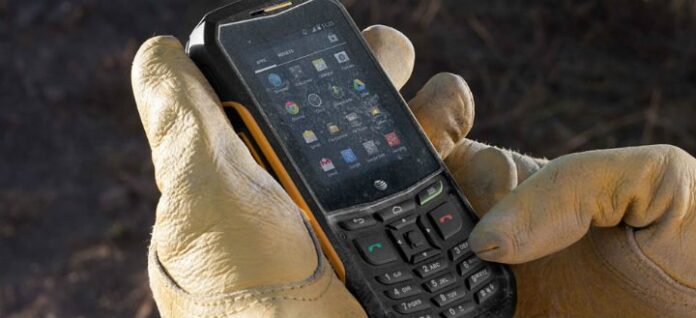Smartphones are now practically everywhere, having penetrated the consumer and enterprise markets early on and are now taking aim at the ruggedized environments.
A handful of such devices have been rolled out by devicemakers big and small, with some providing mere lip service (Samsung), while others are staking their claim on smartphones able to handle more than the sweaty palms of teenagers. Those include Casio, Kyocera and Sonim. These ruggedized devices have been a staple of outdoor-based enterprises like construction and the oil and gas industries, with smartphone variations now being moved into that market.
Bob Plaschke, president and CEO of Sonim, provided some insight into how the company has seen the market for ruggedized devices evolve, including the importance of carrier relationships, which Plaschke said was “critical.” Plaschke also noted that the increased attention being paid toward the public safety community and ongoing FirstNet plans has opened up new avenues for the ruggedized device market.
RCR Wireless News: What is Sonim’s key differentiator when it comes to mobile phones?
Bob Plaschke: We design our communication solutions from the ground up and build for usability, not just durability. It starts with the subsystems we select for audio, display, power management and so on. It finishes with the accessories to enable hands-free mobility. Finally, we design our phones to embrace the developer community to create a vibrant suite of business solutions.
RCRWN: What vertical markets most rely on the rugged devices?
BP: Verticals like oil and gas, and construction, where the cost of failure can have dramatic implications. These are the verticals we focus on initially, which are very excited to get nonproprietary/open platforms to help them build long-term and cost-effective solutions for their business.
RCRWN: When you speak with businesses, what are they most looking for in selecting a device?
BP: The Fortune 1000 customers we work with care about complete safety and productivity solutions. They do not care about the latest smartphones, features and apps. They care about partners that can bring total solutions to them and can help them deploy custom solutions within their organization. We at Sonim, focus on a select number of industrial verticals like construction services, short-haul transportation and manufacturing services where we can understand their key business drivers and how we can bring communication and computational-based solutions to solve those business objectives.
RCRWN: Sonim recently introduced its first rugged smartphones. Can we expect more?
BP: The XP6 and XP7 are just the start of a full portfolio of smartphones, accompanied by tablets and “phablets.”
RCRWN: Does Sonim have plans to target the general consumer market?
BP: It’s not a priority. While we have folks who continue to inquire in the active sports market, at this point it’s a nice to have.
RCRWN: What are the biggest challenges in “ruggedizing” a device?
BP: Our focus is on usability. The industry talks about ruggedization as an IP rating. Users, however, care about usability. The ability to rely on their device for two shifts straight. The ability to use it with work gloves. The ability to see the screen under direct sunlight. The ability to use it in oil fields where intrinsically safe equipment is a must.
RCRWN: What was different in terms of development between a ruggedized feature phone and ruggedized smartphone?
BP: Making the phone is table-stakes. Making the phone available to unlimited developers in the application and accessory communities is the exciting and challenging part for us.
RCRWN: What other value-added benefits and support do you offer businesses?
BP: Our complete and total focus on industrial verticals. As a result, we are building ecosystems that allow these Fortune 1000 enterprises to create their own bespoke solutions for worker productivity. All at a very heavy discount compared to traditional methods and other ecosystems.
RCRWN: Can you provide more insight on your recently opened developer program?
BP: We now have over 100 application and accessory partners who are actively creating solutions for our Fortune 1000 customers. We felt that we should formalize this program to reach a broader group of experts to support and focus on our specific customer needs.
RCRWN: Public safety continues to be a high priority around the country and it also seems to be an area of interest for Sonim. What are your plans for supporting the public and private sectors in this area?
BP: We support FirstNet and its mission to bring broadband capabilities to agencies throughout the United States. As such, we will be conducting pilots with major U.S. police and fire departments to prepare for the arrival of the network in 2016. Building on our recent win with the U.S. Army we are serving multiple defense agencies with consumer off-the-shelf-based ultra-rugged solutions.
RCRWN: Can you name some of the companies that currently sell or use your products and services?
BP: In the U.S.: two of the top five hotel chains; three of the top five automotive manufacturers; two of the top five airlines; two of the top five public utilities; two of the top five public school districts; and two of the top three express package delivery services.
RCRWN: How important are carrier relationships for Sonim in terms of distribution?
BP: Critical. While there are a number of channels out there we can and might use, we believe that carriers are incredibly well-positioned to bring broadband solutions to the industrial verticals that we serve.
Bored? Why not follow me on Twitter?


